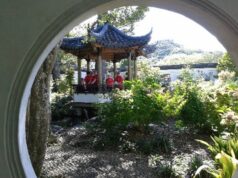DON’T PANIC
不要惊慌 (Bùyào jīnghuāng)
Over the past several months I have been asked by many people to comment on the New Zealand – China relationship. Rather than repeating myself over and over – at the risk of sounding like a broken record (or scratched CD – or corrupted MP3?) I thought I would write it down. Please be mindful these are my views as of today (20th of Feb 2019) and in International Relations things can change quickly.
There would seem to be a cooling in the relationship between New Zealand and China. What is less clear, is it China having an issue with New Zealand or China reacting to an issue New Zealand has with China – or is the whole thing being blown out of proportion?
- China in the NZ Media.
Since I first became interested in China (in the mid-1990s) I have always wondered why China-bashing in the media is so popular. The fear of the unknown or “other” is often a good target to point to – it grabs people’s attention. I suspect if China were a Western (English speaking) country we would not have anything near the amount of negative media coverage that we do. Take for example the foreign ownership debate – while the reality is the majority of foreign property investment in New Zealand is from Australia, the UK, USA and Canada – China is the usual target for condemnation. Since before the last election anti-China media reporting has continued to grow. (Do you remember the National Party’s Dr. Yang Jian who was accused of being a spy?) – This hasn’t been lost on the Chinese community in NZ, the Chinese Consulate in Auckland or the Chinese people in China who are interested in us.
- NZ in the Chinese Media.
Xinhua is the largest media network in China – it is also state run. There are a very few articles which focus on New Zealand in a negative light. However, recently the Chinese Consulate issued a press-release about NZ being unsafe for Chinese tourists. This was picked up by Xinhua. The majority of articles about New Zealand could be seen as positive or neutral – New Zealand is perceived as ‘mostly harmless’
- NZ-China Year of Tourism
The official line was that the opening ceremony was postponed (not cancelled) due to a scheduling issue. However some elements gained public attention with their claim that the New Zealand-China Relationship has soured to the worst it has been in 40 years – pointing to the ‘canceling’ of the event as the main example. I wonder if it has more to do with the fact that in May 2018 the China National Tourism Administration was dissolved and a portion of the remaining staff were merged with the Ministry of Culture and Tourism. I wonder if the ensuing disorder created by the restructuring of their massive government department disrupted the organization of previously scheduled activities in New Zealand? – Could it be we are reading too much into it because our media were ignorant of the situation in China?
- Air NZ and the boomerang flight
The general media consensus is that the Air New Zealand flight which was turned around while en-route to China had incorrect paper work.
Other reports claimed (unconfirmed) that the error in paperwork stated the Republic of China (Taiwan) as its destination. Regardless of whether this is true or not, the topic of Taiwan is a very sensitive topic in Mainland China. It is especially sensitive when a foreign country (and Air NZ as our national carrier is seen to be representing NZ) is perceived to be making a statement about China’s domestic affairs. What I hope was simply a clerical error by Air NZ staff may have been misinterpreted as a provocation. It is no surprise the flight was not permitted to land – regardless of which ever national carrier was involved.
- Drop in Chinese students coming to NZ
It was reported that there is a 10 – 20% drop in international students coming from China. I expect this is correct however I do not think this is part of a Chinese government plot to punish New Zealand. Over the past 12-18 months there have been a number of changes to policies which affect international students. Many Chinese students (and their parents) plan out their study pathway – often beginning in high school, through to tertiary study, on to employment and finally permanent residency. Policy changes around foreign home ownership (many parents buy a house for their child to live in while studying), changes to immigration policies and the upsurge of anti-China sentiment in New Zealand have spooked many perspective students (and their parents) who are looking for certainty.
- Government ministers blocked from entering China?
I am not sure if this is genuine or some political stunt by the opposition party – I have not seen any evidence relating to this. If it is true it would not be unheard of. Earlier this week the UK Chancellor of the Exchequer, Philip Hammond, had to announce that his trip to China was scrapped after the UK Defense Secretary warned that Beijing was ‘Developing its modern military capability’. (Ironically while at the same time announcing the aircraft carrier HMS QE was being deployed to Asia).
- What is contributing to this negative sentiment?
- Huawei
Huawei wants to contribute to the building of New Zealand’s 5G network but concerns around security saw questions being asked about security (there has been no formal ban on Huawei’s involvement in New Zealand). Currently Australia and the USA have banned Huawei. Last week the UK permitted them to work with their national telecommunications companies to build their 5G network.
New Zealand’s stance on Huawei is frustrating to Beijing. Huawei is a Chinese flagship company – as the country tries to break away from its reputation as a manufacturer of cheap quality products to a position of leadership in innovation and technology. New Zealand also didn’t do its self any favors on how it publicly communicated its concerns about Huawei. It sent a message (rightly or wrongly) to Beijing that Wellington will side with Washington as a member of the five eyes network.
- Anne Marie Brady – and (more importantly) the media reactions
Anne Marie Brady is an Academic in Christchurch who for many years (since 2003) has published articles about Mainland China. Many of these have been critical of China, and specifically the Chinese Government. Supporters of her work include the Taiwan Foundation for Democracy based in the USA. The New Zealand media have widely cited her more recent article: “New Zealand and the CCP’s magic weapons”. The article does include factual inaccuracies, several of which were referenced by the media but were not retracted when corrected.
The media has also widely followed and sensationalized the reports of break-ins at her home and office as well as a claim of car tampering. Many reports named the Chinese government as being behind these events but as of last week the NZ Police stated that after a thorough investigation there was no evidence to support these claims.
While it is impossible to say what actually happened, the unsubstantiated and irresponsible reporting risks alienating China and creating suspicion of Chinese people in the eyes of New Zealanders.
- Unhelpful official speeches / comments and changes in policy
While I do not believe the current coalition government has an anti-China agenda it is easy to see with a small stretch of the imagination how it may be interpreted as such. Our Defense and Foreign Ministers have both made speeches in which China wasn’t painted in the best light. The most blatant of these being when Defense Minster Ron Mark stated: ‘complex transnational threats will disrupt New Zealand’s neighborhood in ways not previously seen,“highlighting disruptive behaviors by China and Russia. Mark also said he had had “a very frank” discussion with his Chinese counterpart at the recent Shangri-la talks in Singapore. While in western culture ‘very frank’ maybe appreciated in Asia, ‘subtle’ and ‘nuanced’ is usually the better course of action when addressing sensitive issues.
Policy changes may also be a point of frustration – not so much for the Chinese government but for many Chinese people (as well as migrants from other countries) living or considering moving to New Zealand. Changes to visas, rights to work, foreign ownership, and the uncertainty felt by many around immigration all contribute to a feeling of being less welcome than previously.
- My take on the current relationship between NZ and China
My take, (and this article is very much my own personal take on the relationship) is that we may be experiencing a slight cooling in the NZ-China relationship. I do not however think it is as serious as stated in the media. I also do not feel it will be a long term cooling – more of a speed bump. We saw similar (and far more pronounced) ‘speed-bumps’ in 2017 and 2018 between China and South Korea, and China and Australia – both of which rectified themselves after some time. After speaking to a number of friends from New Zealand and China we all agree the best thing to do is just carry on – things will right themselves.
- Let’s not think too much but let’s think critically
I feel that elements in New Zealand have created a feeling of unease by trying to connect issues which are largely unrelated. It isn’t all about us. We are only a bit player on the China stage. We frequently overestimate our importance to this global power.
I encourage those who are involved in the NZ-China relationship to think critically about the motivations of the authors of articles as well as consider the overall picture: China is rising which is creating a shift in the global order, the USA will likely lose its place as the hegemonic power. The USA and China will vie for influence and New Zealand is caught between the two.
- Let’s be mindful of what we say.
I am concerned by the media, and how easily they jump on the ‘China-bashing bandwagon’. This anti-china sentiment affects our local Chinese who need to deal with upswings in prejudice against them. Many Chinese who experience a rise in racism (which is exactly what it is – racism) talk to their friends and family back home, hurting the reputation of New Zealand. Such reports also reach the Chinese government, where they contribute to blurring the line between the official New Zealand stance on China and speculative reporting.
What is not fully understood is that in China the media are either directly controlled by the State or adhere to the official narrative. The situation in New Zealand is totally different. I suspect that neither country fully appreciates the difference between these two ways of operating.
While the majority of us are not in a position to influence the media we can be mindful of what we say publicly. Before saying something overly critical of China or Chinese people we should consider how these comments will affect individuals and the NZ-China relationship as a whole.
- China is important to New Zealand.
China is here to stay. The country has gone from one of the world’s poorest in the 1940s to the second largest economy today – and due to surpass the USA by 2030. 40 years of an average 9.5% GDP growth has created the world’s largest middle class – many of whom are eager to engage with the world. Chinese culture and language is becoming increasingly well received globally – in particular in Africa (the future engine for global economic growth). China’s scientists are also making waves, with increasing numbers of patents being lodged in China. Chinese factories are pumping out less cheap ‘crap’ and more high-tech electronics, software, pharmaceuticals and popular media.
Looking at it purely from a NZ economic development viewpoint: China is New Zealand’s largest trading partner and source for international students. China is also our second largest source of tourists (and is expected to become a largest source by 2024). While China is not one of the largest foreign investors in NZ (in fact Asian investment [of which China is only a part] makes up only 10% of the total), what they do invest in is important – businesses! Chinese investment creates local jobs and adds value to our primary sectors. At a grass roots level, small Chinese owned businesses are contributing to the revitalization of our shopping centers with new cafes, restaurants and retailing businesses. Skilled migrants are filling job gaps in a range of fields including IT and design.
- No knee jerk reactions please
I recommend that we (we being local councils, RTOs, EDAs, businesses or individuals) do not do anything ‘dramatic’ in the meantime. The mantra “Don’t burn your bridges” springs to mind. If you are planning on going to China I would not recommend cancelling your trip. As far as I can tell there has not been any reported risk to New Zelander’s safety in China or confirmed reports of a rise in visa application refusals.
It is important we keep people to people contact an individual level as well as through local government diplomacy. Breaking ties with China will only further exacerbate the situation – in fact I feel we should be doing the opposite – working to build more links with the country and its people.
While this article is only my personal view, it is based on my experiences having lived, worked and studied in China. I have also spent close to a decade involved in local government diplomacy between New Zealand and China and run a company with offices in both countries. During the process of writing this article I have spoken with a range of people from business and in government. I am not trying to create controversy, simply asking that people keep calm and continue promoting connectivity between our country and China.
Written by Simon Appleton – CEO of Eastern Bridge Limited and National Secretary of the New Zealand China Friendship Society.




